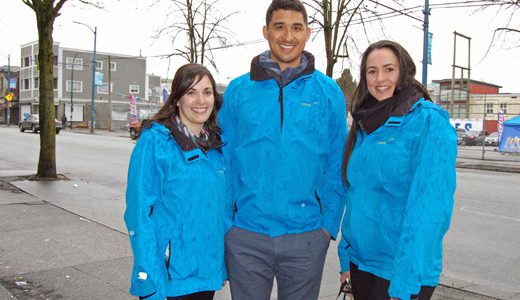Nurse practitioner trio takes to the streets
Sometimes success isn’t aiming high but aiming low.
In the Downtown Eastside, three nurse practitioners (NPs) — all members of Primary Outreach Services — are pounding the pavement to lower barriers to care for Vancouver’s most vulnerable residents.
“Many of the people we see aren’t capable — mentally or physically — of attending clinics,” explains Jodie Foster, who’s worked in the neighbourhood since 2005.
“As nurse practitioners we provide access to care for those who traditionally won’t ask for support but are frequent users of the Emergency Department. We aim to deliver services with even lower barriers than low-barrier clinics.”
Meeting clients where they’re at
The Primary Outreach Services team takes any opportunity to provide health care. For Jodie and her NP colleagues — Michael Gartner and Meaghan King — opportunities include assessing clients in common rooms, in hallways and even on the street.
The NPs work closely with people staying in shelters and living in single-room-occupant (SRO) buildings. “Our nursing staff attend the hotels regularly and will call us in if a client doesn’t have a primary care provider or if they can’t make it to their doctor,” says Jodie.
“Flexibility and adaptability are key,” says Michael. “We assess clients, prescribe medications and connect them to other resources. We have focus on their priorities and as we build trust, they accept more suggestions. What we do is very much patient-centred care.”
Meaghan likens her days to working in a walk-in clinic. “You never know what you’ll be doing from one day to the next.”
At ground zero of the opioid crisis
Prior to the Overdose Prevention Sites, Primary Outreach Services staff were responding to at least one opioid overdose daily. Sadly, overdoses still occur frequently and Jodie and her fellow NPs are often the first medical responders. They’re also on the frontline of treatment.
“Nurse practitioners can prescribe suboxone and part of our outreach work is to ensure clients are adhering to and continuing their opioid replacement therapy despite their chaotic lifestyle,” she says.
“Every meeting is an opportunity to educate clients about the tools and resources available for addiction treatment,” adds Meaghan. “All our clients have stories about overdoses.”
The team advantage
Meaghan and Michael are new NPs; they’re also new to community care. Both feel fortunate to be part of a team at the start of their new careers.
“It’s been very helpful to have other NPs to bounce ideas off of,” says Michael, who came to the profession because he wanted to make decisions regarding patients’ care plans.
Meaghan agrees. “I wanted to be an NP because of the expanded scope of practice it offers, but it’s great to have colleagues for a quick consult and second opinion.”
Even a veteran like Jodie appreciates the team advantage. “We try to get together weekly to review difficult cases and learn from one another, and we have the support an interdisciplinary team. As NPs, I think we all feel that we wouldn’t be able to do our jobs and increase access to quality care without the support of our Primary Outreach colleagues.”
More stories on nurse practitioners
- Because physicians can’t do it alone: Meet NP Bonnie Giovannetti, VGH Neurosurgery Unit
- Barb sees gaps in care when others can’t: Meet NP Barb Eddy, Downtown Community Health Centre
- “Our clinic relies on Lisa”: Meet NP Lisa Lee, VGH Pulmonary Hypertension Clinic

